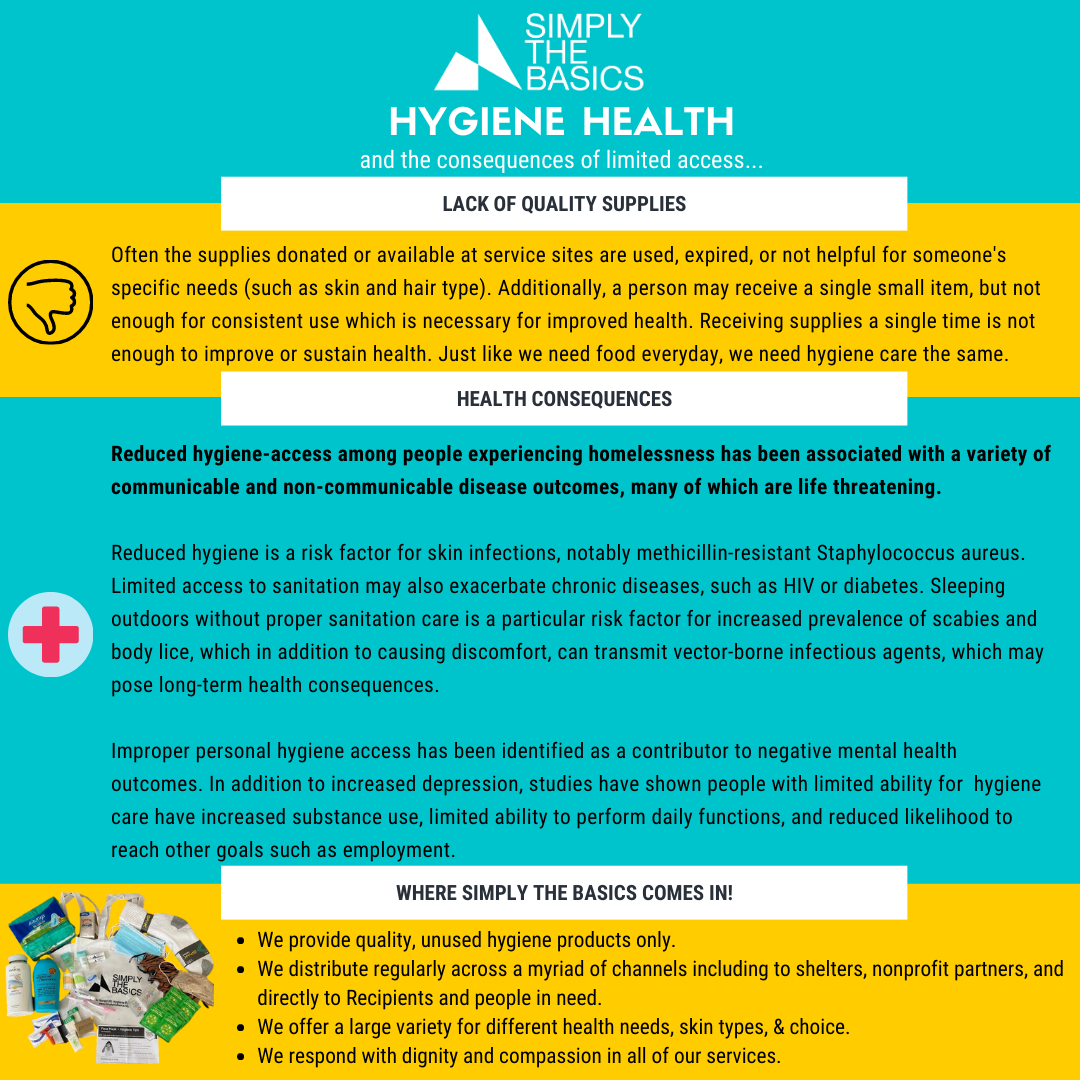Shareable Flyer on Hygiene Health impact and services from Simply the Basics.
Simply the Basics improves and sustains the health and wellness for people experiencing homelessness or at risk of homelessness.
Many people experiencing homelessness suffer from preventable health conditions which could be avoided with regular access to proper hygiene and other basic needs. This issue is not just confined to the streets. Individuals experiencing poverty often forego basic needs so as to make ends meet. The aim of Simply the Basics is to provide access to these basic needs so as to improve the health and wellbeing of the homeless and low-income community.
A horrific fact is that government support often does not cover menstrual hygiene products, toilet paper, soap, toothbrushes and toothpaste, shampoo, lotion, and many more items we use every day to avoid disease, remain clean, and feel dignified.
A 2016 national survey found that 67% of the people experiencing homelessness reported one or more preventable health conditions and 34% reported that their health made it difficult for them to keep a job or to handle daily living activities. To care more optimally for people, we must pay attention to functional disabilities caused by lack of access to proper hygiene.
Hygiene and Health
Personal hygiene encompasses all of the daily routines that help keep your body clean. This includes regular healthy habits of brushing your teeth, washing your hair, washing your hands, cleaning your body with soap and water, wearing deodorant, and keeping your clothing clean. When people don’t have access to these products, certain consequences may develop ranging from social problems to serious diseases.
Proper hygiene and health are intimately interwoven, and poor hygiene is an inevitable result of homelessness. As compared with people who have homes, homeless persons are more likely to have dermatological problems, functional limitation, seizures, obstructive pulmonary disease, foot pain, and decayed teeth. Additionally, people who spend most of their time outside are at high risk for immersion foot, cuts leading to infection, and hypothermia during the cold and rainy periods. The risk of death is increased eightfold in people who experience these conditions.
Cellulitisis a common, potentially serious bacterial skin infection. Left untreated, the spreading infection can rapidly turn life-threatening. Cellulitis occurs when bacteria, most commonly streptococcus and staphylococcus, enter through a cut or break in your skin, however cellulitis is completely preventable with access to proper lotions.
Bacteria, Viruses, and Parasites are the primary inhabitants related to poor hygiene and they are the ones that cause deadly infectious diseases. These deadly germs use the human body as a host for reproduction and multiplying in no time thereby forcing the body succumb to their act. Maintaining good hygiene is the best way to protect from parasites, viruses, and bacteria.
Diarrhea is the most important public health problem directly related to sanitation. The simple act of washing hands with soap and water can cut diarrheal disease by one-third. Diarrhea causes a person to lose both water and electrolytes, which leads to dehydration and, in some cases, to death.
Cholera is an acute bacterial infection of the intestinal tract. It causes severe attacks of diarrhea that, without treatment, can quickly lead to acute dehydration and death. Cholera can be prevented by access to sanitation, safe drinking water, and good hygiene behavior.
Trachoma is an eye infection spread mainly through poor hygiene caused by lack of adequate water and unsafe environmental sanitation conditions, such as inability to wash hands. About 6 million people are blind today because of trachoma. It affects women two to three times more than men. Children are also especially susceptible.
Weakened Immune Systems develop across all individuals experiencing homelessness, and is especially common amongst women. Women who don’t have access to the proper menstrual care have to resort to whatever is around, like socks and rags, to absorb their menstrual flow and keep the rest of their clothing from getting soiled. That kind of prolonged exposure to dirty and soiled items can lead to an infection, which can weaken the immune system.
Gingivitis is an inflammation of the gumscaused by a bacterial infection. If left untreated, can become a more serious infection known as periodontitis. Gingivitis and periodontitis are major causes of tooth loss in adults, which in time can lead to more serious heart conditions.
Hygiene and Dignity: “Advancing Wellness”
For most people, personal hygiene is simply a matter of walking into their bathroom and engaging in "washing up" and getting clean. The basic act of staying clean is something that people often take for granted in terms of feeling human and being healthy, and requires great resourcefulness for those experiencing homelessness. For people who live on the streets, maintaining proper hygiene and a sense of dignity is a time-consuming and dangerous endeavor.
One of the first and most prominent consequences of bad hygiene is body odor. Body odor occurs due to the interaction of bacteria and sweat produced by the apocrine glands. Bad breath proves another easily recognizable consequence of poor hygiene. It commonly develops from not regularly brushing and flossing your teeth.
Cleaning oneself can remind people of the appearance they once maintained before a life on the streets. Re-establishing a hygiene routine is key to recovering a sense of self.


